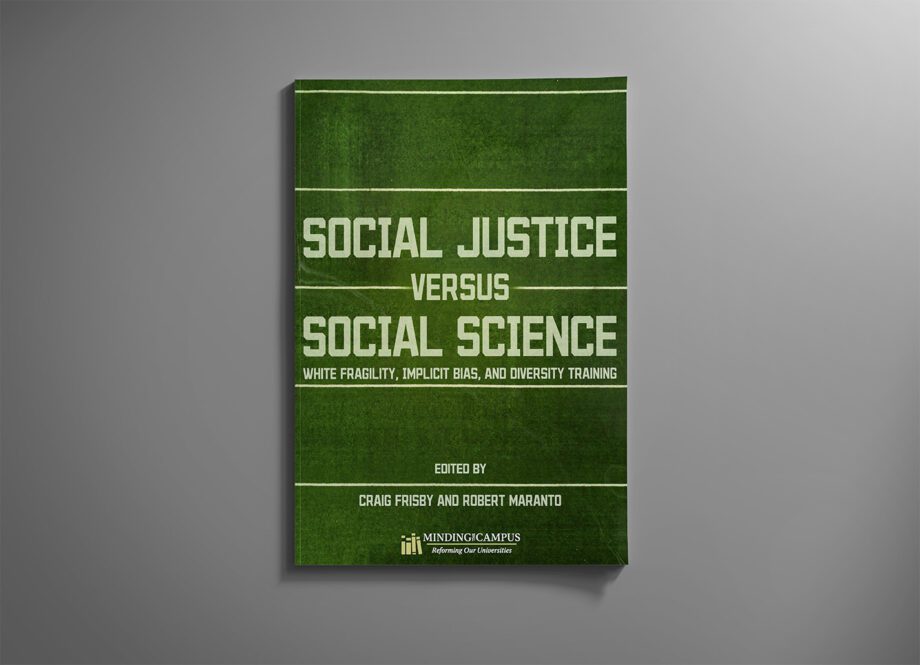If you’ve spent any time in higher education, you’ve probably been told that all white people are inherently racist, police forces should be defunded, and that “diversity, equity, and inclusion”—with a new side of “belonging”—should guide every aspect of modern life. Maybe you’ve even sat through a diversity training where microaggressions are sins and America’s founding is boiled down to little more than slavery. These narratives are hard to escape—they dominate classrooms, faculty meetings, and public discourse.
But they’re not the full story!
Minding the Campus is proud to present Social Justice versus Social Science: White Fragility, Implicit Bias, and Diversity Training, a book that challenges these wrong, but prevailing ideas. Compiled and edited by Craig Frisby and Robert Maranto, and featuring contributions from leading thinkers like Helen Pluckrose, James Lindsay, Bradley Campbell, Eric Kaufmann, Wilfred Reilly, Musa al-Gharbi, and George Yancey, this collection offers a much-needed critique for anyone tired of the one-sided dogma flooding the conversation on so-called “social justice.”
Opening with a pointed critique of Robin DiAngelo’s White Fragility, Frisby and Maranto argue that this concept perpetuates a counterproductive dialogue, framing white individuals in a no-win situation regarding accusations of racism and contend that such ideologies distract from genuine conversations about racial disparities and their root causes, such as socioeconomic status and educational inequalities.
Wilfred Reilly—familiar to Minding the Campus readers—also revisits Barry Glassner’s the Culture of Fear to show how today’s anxieties have shifted—society once feared far-fetched threats like kidnappings, but now obsesses over narratives of police brutality and systemic racism. “Thanks to social media and movements like Occupy, the Tea Party, and Black Lives Matter, the so-called ‘threats’ we hear about nonstop—police violence, racial crime, ‘systemic racism’—are more tribal,” writes Reilly. “But they’re no less exaggerated or nonsensical.”
Reilly backs this up with hard data—the book has a lot of data. “In a typical year, 999 people—most of them armed—are killed by police. Only 250 of them are black,” Reilly points out, debunking the belief in rampant police brutality against black men.
But Social Justice versus Social Science doesn’t stop at police. It asks the bigger question. Like what exactly is racism?
According to Frisby, we’re being sold a story where racism is a shadowy, all-encompassing force—deeply tied to “whiteness” and affecting every “person of color.” Racism, as the left puts it, is woven into the fabric of every law, institution, and cultural symbol. Proponents argue that racial disparities in politics, education, and the economy prove racism’s ongoing power, and without it, minority groups would enjoy equal success. They even claim racism is so deeply ingrained in America that whites will always have racist tendencies, meaning we all need constant anti-racism training—starting in childhood.
And, of course, the “woke” crowd is expected to lead the charge. From demanding minority quotas to pushing for reparations, the fight against racism has turned into a moral obligation. Those who embrace this mission believe it will bring about a utopia of social justice, harmony in the workplace, and economic equality.
But does this relentless focus on racism overlook more nuanced realities? The authors of Social Justice versus Social Science think so.
The book wraps up with seven guiding principles for future discussions on race—advocating for open, honest dialogue and a return to merit-based systems. And all authors emphasize free speech and empirical evidence as the keys to real progress in the race conversation.
Social Justice versus Social Science isn’t just a critique of today’s social justice dogma—it’s a call for a smarter, more honest conversation. It challenges readers to think critically, question prevailing ideologies, and engage in real dialogue—without the polarization.
Read it here.
Image by Yurii Zymovin — Adobe Stock — Asset ID#: 213669040




